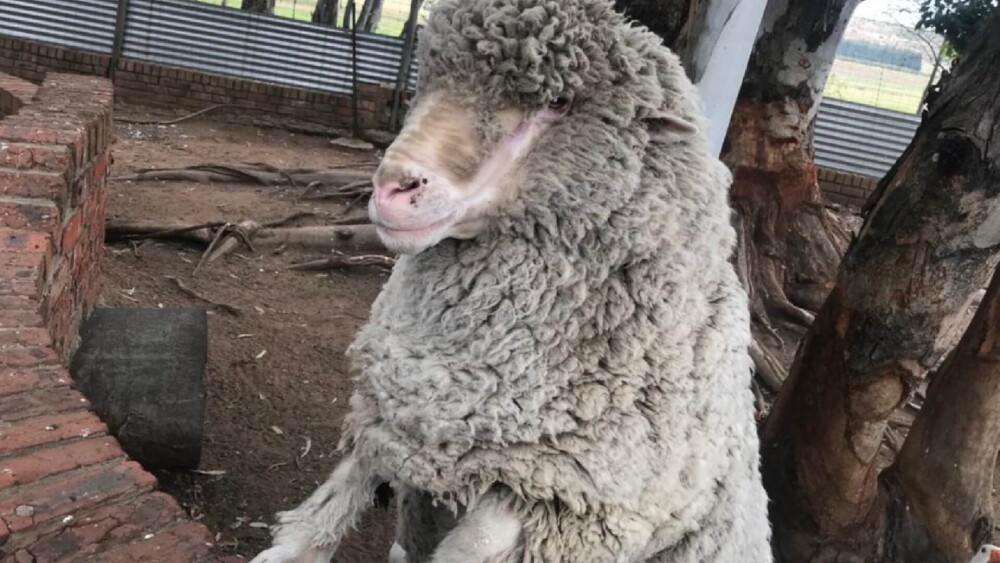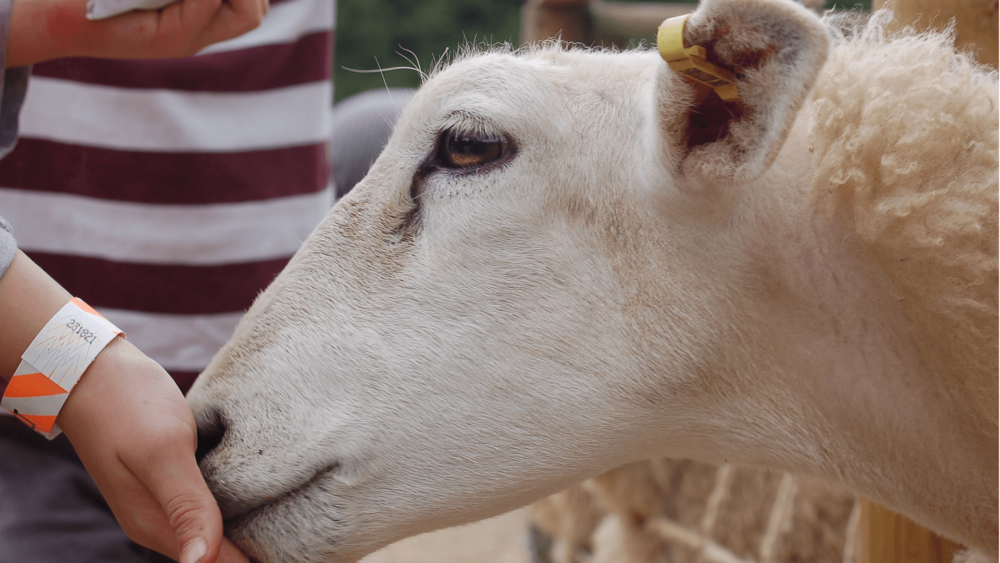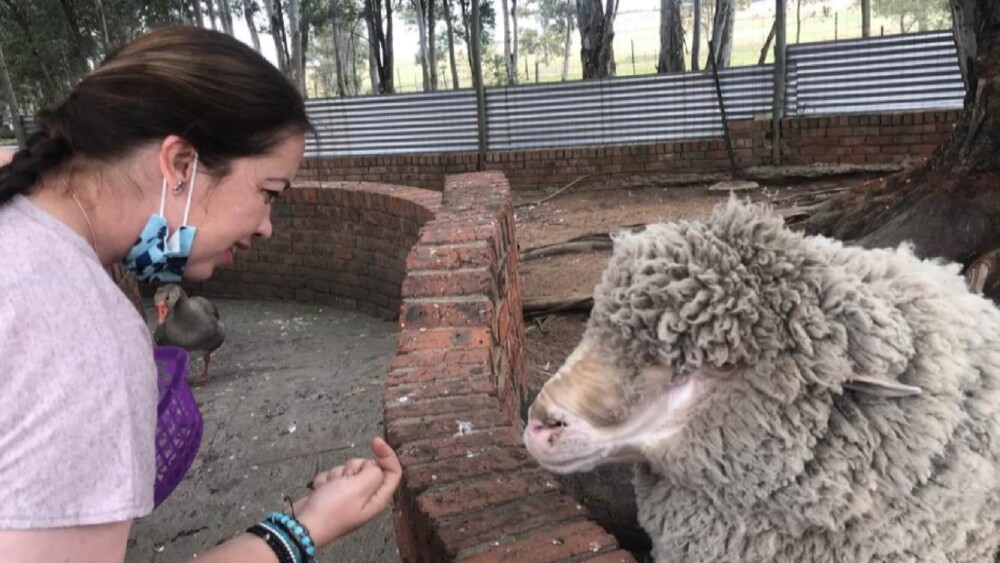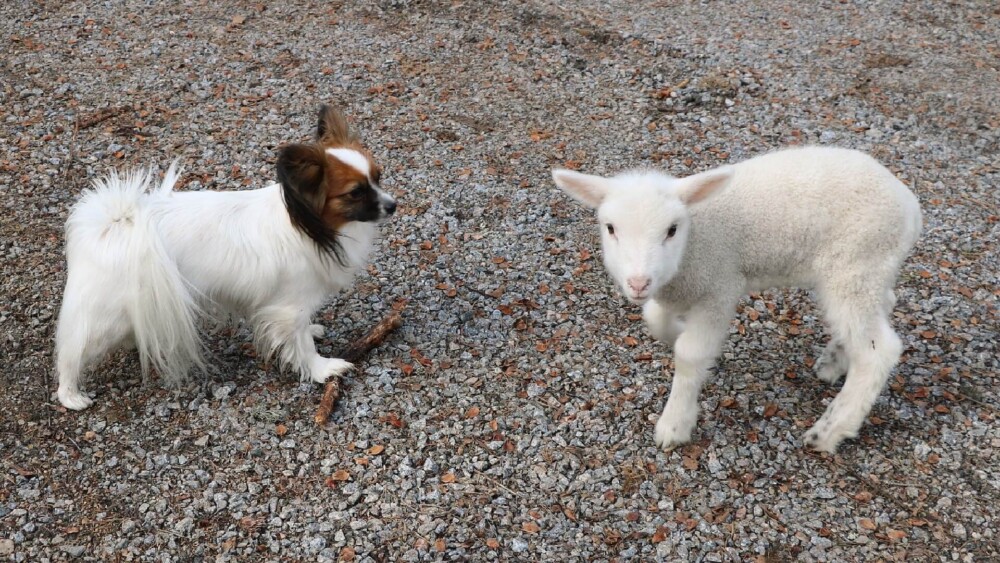Sheep are ideal pets for kids. And, when a newborn lamb is abandoned by its mamma, as is common on the farm, that lamb often becomes a pet. And, its human family wants to give it treats. But, sheep have very different digestive systems than people, and their treats should be different also.
After weaning, what snacks or treats can your lamb or sheep eat? With sheep, it is best to go natural in what you feed them. While sheep may eat anything they can find, including Doritos, it can be catastrophic to their health. Feed only natural foods such as alfalfa cubes, hay, sunflower seeds, apples, carrots, oats, squash, and watermelon. All of these your sheep will enjoy snacking.
But, there is more to know about sheep snacks, so let’s get started!
If you feed your pet sheep an incorrect diet, you can endanger their lives. The results can be a medical condition, like bloat, urinary calculi, or white muscle disease. The temptation may be there to let your pet lamb also suckle away at some left-over table scraps, but avoid this because lambs have their unique diet. Snacks will make them ill.
I am more of a horse person, but I recently had the fantastic opportunity to spend a weekend helping a neighboring farmer during lambing season. Several lambs abandoned by their moms. As a result, we were warming up bottles, and the sound of little bleating woolen bundles clomping along on the old farm house’s wooden floors was an absolute joy.
During my weekend stay, I also met some of the resident sheep raised as pets. These tame sheep were used for therapy in the farmer’s small petting zoo. One particular pet sheep, a young ram ironically called Lamb Chop or Choppy, was a real pleasure to feed snacks to, and I quickly learned what I could treat him with and what would make him ill.

Sheep Have Unique Digestion
Sheep are ruminants. Their unique digestive tract helps them pull nutrients out of grasses and other forage that many other mammals’ stomachs can’t do. Like goats and cows, sheep shouldn’t eat the same types of foods that humans, dogs, or cats can eat.
Their 4-part stomachs move food between them and nurture a host of good bacteria that break down and ferment grasses to provide the energy your flock needs. When sheep are fed high-sugar foods, other types of bacteria flourish in their stomachs, and they can bloat and get sick.
It may sound ironic, but even alfalfa is a high sugar food for sheep so consider how much fruit can impact sheep. For more information on the best types of foods to feed sheep, check out this article on The best kind of hay to feed goats, who have an identical digestive tract.
25+ Treats to Feed Sheep: Healthy and Natural
Not all natural foods are a great or wise treat for sheep, but the following foods are safe to give to your pet sheep, and they can help your sheep be healthier overall.
1. Alfalfa Cubes
These easy-to-feed cubes are natural feed supplements that you can purchase from farmers’ co-ops. Alfalfa is legume hay grown specifically for livestock feeding since it is rich in calcium, fiber, and protein.
For ewes that are close to lambing, alfalfa provides much-needed nourishment to help milk production along. However, you should not overfeed on alfalfa as it can also be a decadent treat that can cause other issues such as milk fever if the ewe already has too much calcium in her diet.
2. Grapes
Grapes are naturally sweet, so sheep love gobbling them up. As a bonus, grapes are loaded with vitamins and minerals useful to sheep and other livestock animals. Grapes are rich in potassium, copper, and vitamin C and K. Grapes also contain large volumes of fiber and carbohydrates.
Again, feeding grapes should be limited as sheep with excessive copper intake can struggle with copper toxicity. Grape pomace, or the left-over skins and pips from pressed grapes, can be an excellent feed additive to encourage milk production if fed in moderation.
3. Apples
Another nutrient-rich fruit, apples, are a firm favorite with sheep. Most sheep will happily gobble a slice of apple from your hand. The benefit of feeding apples as a treat to sheep is that the pH of apples helps balance the digestion of sheep, which are ruminant feeders. Be sure to feed ripe apples as sour apples may have the opposite effect, causing bloat in sheep.
4. Dandelions
Sheep naturally like to eat herbs and weeds. In fields where sheep graze, flocks usually devoir weeds like ragwort and dandelions. Many farmers use this as a way to get summer grasses to reestablish in their pastures.
Offering your sheep a dandelion (or ten) will be a welcome treat. Plus, the sweet taste is a firm favorite. Additionally, dandelion is known to be an immune-boosting herb.
5. Oats
This fiber-rich grain is a popular feed additive for sheep farmers. Oats are dense in protein and other valuable nutrients. Adding oats to a homemade treat or feeding it whole by hand is a great way to bond with your sheep. Plus, it helps meet some of their nutritional needs.
6. Soybeans
Farmers have been alternating between soybeans and corn in feeding lambs up for market across the U.S. for several years now. Soybeans are highly palatable, and these beans can also be a protein-rich snack. Carry a handful of soybeans in your pocket when you visit your pet sheep, and they will love you for it.
7. Bamboo
I was surprised to learn that sheep love bamboo leaves. They happily snack on clumping bamboo leaves in their paddocks, and growing one to provide an extra treat is an intelligent way to increase your sheep’s natural fiber intake. Some bamboo species also give as much as 20% protein content, making it a great way to boost your sheep’s diet.
While staying with my friends, we picked new green bamboo shoots and fed this to the sheep, who approved.
8. Strawberries
I love strawberries, so I wondered whether sheep could also enjoy these juicy fruits, while walking along with the paddocks. My farmer friend advised me that while sheep can eat strawberries, and they certainly enjoy them, it should be a once-in-a-blue-moon treat.
Strawberries are high in sugars, which can cause problems for ruminant feeders like sheep. Additionally, strawberries may also contain pesticides used in their production, which can prove toxic to sheep.
9. Comfrey
Animals love the taste of comfrey, and with the high nutritional value, it is a great natural treat for sheep. You can also feed comfrey as a fresh treat by picking the leaves and feeding immediately to sheep, or you can dry the leaves for at least three to five days, feeding when you want to. Comfrey contains potash, iron, and phosphoric acid, which all contribute to balancing the sheep’s diet.
10. Beets
Feeding sugar beet pulp is a great way to help a sheep gain condition. They love the taste, and while they will quite happily eat the dried shavings or cubes. Soak this in water before you feed it as a treat to your sheep.
Since the pulp expands when it soaks up water, feeding the dry pulp can lead to a sheep’s digestive tract drying up. Your sheep may end up bloated if you aren’t careful to soak the beet well.
11. Bananas
Most of us have bananas at home, and sadly, these also spoil quickly. Luckily, sheep love bananas, and you can easily feed it skin and all. Bananas are rich in nutrients like proteins, fiber, vitamins, and antioxidants.
Since it is quite a dense nutritional treat, you should avoid overfeeding on bananas. Sharing a small banana with a sheep or two once in a while is okay. But, trying to feed your sheep two or three pounds of bananas may not be advisable.
12. Pumpkin
By feeding your sheep pumpkin seeds, you are improving their nutrient intake. Pumpkin seeds have a rich protein content, and it is an excellent source of fiber. Carry a few seeds in your pocket, and your pet sheep will quickly come bleating around when you visit.

13. Carrots
While I certainly know that horses love carrots, I was surprised to learn that sheep love them too. When fed in moderation, carrots are a great snack for sheep. Be sure to cut the carrots into small pieces before you provide them to sheep as a whole carrot can present a choking hazard to sheep.
You can feed carrots raw or cooked. You can also mash cooked carrots, add it to your sheep’s daily ration of oats or alfalfa and feed it to your sheep. Cooked carrots make a great feed additive and treat for sheep on a cold winter’s afternoon.
14. Prickly Pears
While sheep may like the soft pears you buy in shops, I speak of the cactus pear or prickly pear. These desert-growing pears are a great way to boost your sheep’s nutrition in dry climates. You can also feed the fruits as a treat to your sheep.
Prickly pear fruits and leaves are a great feed alternative, and they help your sheep maintain their condition and stay hydrated.
15. Garlic
While garlic can cause bloat, it is also a nutritious snack for sheep if you can get them to take it. If there’s one thing that sheep and other ruminants suffer from, it’s worms. Feeding your sheep garlic cloves or even garlic powder is a great way to deworm them. Often, sheep enjoy the taste too. You can also feed the whole garlic plant to sheep.
16. Corn Husks
While corn husks or cobs are not nutrient-rich, except for some additional fiber, these are still great treats for sheep, who love the taste.
17. Squash
In addition to pumpkins, sheep can eat all types of squashes. This includes acorn squash, zucchini, winter squash, butternut, summer squash, and blue hubbard. They can eat Honey Bear, Papaya Pear, Yokohama, Bush Delicata, Pink Banana, Bonbon, and other popular varieties.
18. Sunflower Seeds
Sheep enjoy sunflower seeds, but like grains, you should feed them sparingly. Don’t feed more than once a day and continue to feed your lamb a diet primarily of hay.
19. Herbs
Sheep can eat a variety of herbs. As a whole, herbs should be supplements, similar to vitamins. They shouldn’t be fed in large enough quantities to replace natural forage. Sheep can eat rosemary, mint, thyme, bay leaves, and yarrow. They enjoy lemon balm, parsley, fennel, dill, chicory, catnip, and oregano.
20. Wormwood
Wormwood is a natural plant that’s slightly toxic. However, its traditional uses as a dewormer make it a tasty occasional treat for sheep. The toxicity that can be harmful in large quantities helped maintain parasite control before commercial medicines were available.
Be careful not to feed wormwood to sheep in larger quantities because it can be toxic. Most sheep have a good sense of when and how much they can eat if they have access to it, but there is an occasional exception to that rule.
21. Some Native Plants
Not every native plant is healthy or edible to sheep, but many are. Native plants suitable for sheep include sow thistle, honeysuckle bush, dandelions (healthy for most pets), lavender, buckbrush, blackberry bushes, and ficus. Other native plants include watercress, wormwood, broadleaf plantain, crabapple leaves, and grasses.
22. Many types of Fruit
Feed sheep fruits in minimal quantities. Sheep are ruminants and do not process sugars the same way that people do. As a result, feeding fruit to your sheep can very quickly upset the bacteria in their stomachs and make them ill.
If you choose to feed your lamb fruit, do not do more than ¼ to ⅓ of the total fruit per animal and do not give it to them more frequently than once a week. Watch for bloating afterward. Other fruit (not already listed) edible to sheep include watermelon, pitted fruit such as peaches, pears, and apricots.
23. Common Ground Mallow (Marshmellow Plant)
One native plant that is healthy for sheep includes mallow, commonly called marshmallow plant. Mallow spreads quickly and grows fast. Mallow is healthy for sheep, but they won’t always eat it if there are sweeter grasses and bushes to munch on first.
24. Flowers
Many flowersheep natural to regions of the United States. Most of these are edible to sheep. Edible flowers include violets, agapanthus, black-eyed Susan, roses, angel wing begonias, camellias, and daisies.
If you don’t want your sheep eating your flowers, make sure to pen them up, or they will find the treat on their own!
25 Someme trees
The leaves of common landscaping trees make great treats for sheep. Crabapple leaves are loved and healthy for sheep and goats. Other trees whose leaves are healthy include Baccharis, or coyote bush, elm tree, arborvitae, barkcloth fig, ficus, and dogwood.
When you prune your trees, just share the leaves with your lamb, and he’ll enjoy the snack.

Harmful Treats to Avoid Feeding Sheep
There are several types of fruits, vegetables, herbs, and other foods you should never feed to your sheep.
1. Avocados
Many animals struggle with eating avocados, and you should avoid letting your sheep get hold of any leaves, fruits, or even the pip. Avocado contains persin, which is toxic to sheep and other farm animals.
2. Brassicas
Sheep shouldn’t be fed green vegetables belonging to the brassica family, including broccoli, cabbage, cauliflow, and brussel sprouts. These veggies all trigger gaseousness or bloat in sheep, which can prove fatal.
3. Fruits Rich in Citric Acid
Because citrus fruits like oranges and clementines are sweet, sheep will happily nibble at them. And, in small quantities, it may be okay to feed these. However, the risk of an upset stomach serious complications far outweigh the benefit of feeding to your sheep. So, steer clear of feeding oranges or another citrus to sheep.
4. Celery
While celery may seem like a great green vegetable to feed your sheep, avoid it. The furocoumarins in celery lead to photosensitivity in sheep.
I learned that sheep with photosensitivity can’t handle intense light, and have inflamed mucus membranes, which is painful. Parsley has the same effect, so don’t give yoleft-over this herb either.
5. Potatoes
Some people love giving their sheep leftover veggies, but skins (especially when green) and potato “eyes” can be highly toxic. Both these contain glycoalkaloids toxins, which can lead to alkaloid poisoning. Avoid feeding raw potatoes to sheep.
If your sheep manages to sneak a slice of potato, like Choppy did while I visited and ate a few French fries near his enclosure, it’s not the end of the world. However, I would sheep’sagainst feeding potatoes as a treat.
Should you want to boost your sheep’s condition, you may consider feeding potatoes as it can be a great feed additive; however, always peel and cook these potatoes to reduce the toxin levels.
6. Stone Fruit
Feeding fruits to sheep is a great way to increase their vitamin intake, but you should be careful to depit any fruits as the stones have a nasty way of lodging in your sheep’s stomach. This can create obstructions, and most fruit pits contain the toxin cyanide.
7. Animal Products
Your pet sheep is a herbivore. It is not designed to eat other animals, and I had to educate a young boy who wanted to feed Choppy some beef jerky while I was visiting the farm. Meat fat, milk, eggs, bones, and other animal products aren’t suitable for sheep to eat.
Golden Rules of Feeding Treats and Snacks to Sheep
It is natural for people to want to treat the animals in their care, whether livestock and reared for market, or a pet sheep. Knowing how to feed your sheep treats is essential to keep them healthy.
Rule 1: Feed in Moderation
Your treats should never be more than 10% of the sheep’s daily feed. Feeding more can lead to dietary problems, health issues, and aggressive behavior when the sheep want more treats.
Rule 2: Feed Appropriate Snacks
Before you feed a treat or a snack to your sheep, be sure that those treats are appropriate for your sheep to eat. If you are unsure whether you should feed a particular snack to your sheep, then instead opt not to.
Rule Three: Size the Snacks Appropriately
Sheep, like most farm animals, cannot bite what they eat into smaller pieces. Unless you are to tie down your treat so the sheep can bite at it, you should always cut your treats into sheep-bite sizes. This means that sheep should cut the snack bites no bigger than the feed cubes you buy for sheep from the co-op.
Conclusion
Sheep love treats and snacks. Ensure your sheep remain healthy by feeding appropriate snacks like fresh carrots, apples, cucumber, watermelon, and pumpkin. Avoid feeding animal products, fruits with pits in, and avocados, which are all highly toxic to sheep.
Be sure to feed in a 10% ratio to your sheep’s natural feed per day. Be careful to feed only fresh foods as a treat, and while you can feed your sheep veggie scraps from the kitchen, you should avoid things like potato peels, onions, celery, and gas-causing vegetables like cabbage and broccoli.
My Essential Sheep Supplies
This list contains affiliate products. Affiliate products do not cost more but helps to support BestFarmAnimals and our goal to provide farm animal owners with accurate and helpful information.
This little giant bucket fits on a fence and this one’s easy to carry.
A sturdy dog collar is essential. Don’t do rope (they’ll break and tangle) or chain (injury!).
A Black Water Tub is way nicer than buckets that tip over. I like to get a 20 or 30-gallon in each pen so my goats have plenty of water, but you can get 100-gallons if you have a lot of sheep in one pen.
Loose minerals in a small bag or a Purina 50 lb bag, and a mineral feeder for free-choice is the best option. One side holds minerals, and the other holds baking soda. Don’t feed sheep goat minerals because it usually contains copper- something that is fatal to sheep.
Hoof trimmers are a necessity because you’ll need to trim your sheep’s hooves every few months. These are nice for the price.
Shearers like these aren’t too costly but do a decent job. Sheep wool jams normal shearers and once you are ready, I’d recommend the ones from Premier 1 Supplies.
Don’t make the mistake I made by waiting to order a drench gun before you need it. I was surprised by how often I use it. It helps with bloating, dehydration, and other ailments. Here’s a good drench, but you can also drench a bloat solution or water if dehydrated.
Digital Thermometor for when your lambs act sick. You’ll need to know if their temps are too low or too high so you can accurately diagnose the issues.
Vetericyn for wound care. It makes a big difference in a speedy recovery.
These heavy duty clips for fences, to clip ropes to collars, and a million other uses. They are stronger than carabeeners, which we broke a dozen of before switching to these.

